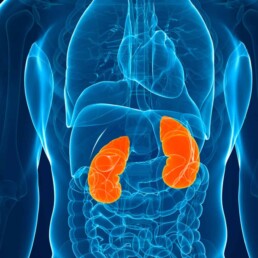In recent years, the field of nutrigenomics has emerged as a powerful tool in understanding how our dietary choices interact with our genetic makeup to influence our health. This exciting discipline explores the intricate relationship between nutrition and genetics, shedding light on how specific nutrients can modulate gene expression and impact various physiological processes within the body. In this blog, we will discuss nutrigenomics and kidney health.
By Majd Isreb, MD, FACP, FASN, IFMCP
Nutrigenomics and kidney health
Nutrigenomics is the study of how nutrients and other dietary components interact with our genes, influencing our individual responses to food and affecting our susceptibility to certain diseases. At its core, nutrigenomics seeks to unravel the complex interplay between diet and genetics, offering insights into how our unique genetic profiles can shape our nutritional requirements and dietary preferences.
The Role of Genetics in Dietary Responses
Our genetic makeup significantly determines how our bodies respond to different nutrients and dietary patterns. Genetic variations can influence enzyme activity, nutrient metabolism, and nutrient absorption, ultimately impacting our nutritional needs and dietary tolerances. By understanding these genetic predispositions, individuals can make more informed dietary choices tailored to their specific genetic profiles.
Gene-Nutrient Interactions
One of the key concepts in nutrigenomics is gene-nutrient interactions, where specific dietary components interact with our genes to modulate gene expression and influence physiological processes. For example, certain nutrients may activate or suppress genes involved in inflammation, oxidative stress, or metabolic regulation, thereby affecting our risk of developing chronic diseases such as obesity, cardiovascular disease, diabetes, kidney disease, and cancer.
Personalized Nutrition Recommendations
Advancements in genetic testing and bioinformatics have paved the way for personalized nutrition recommendations based on an individual’s genetic profile. By analyzing genetic data, healthcare professionals can identify genetic variations that may impact nutrient metabolism, dietary requirements, and disease susceptibility, allowing for tailored dietary interventions aimed at optimizing health outcomes and preventing disease.
Nutrigenomics and Chronic Disease Prevention
Nutrigenomics holds immense promise in the prevention and management of chronic diseases. It provides insights into how dietary factors interact with our genes to influence disease risk. By adopting personalized nutrition strategies informed by nutrigenomics, individuals can mitigate genetic predispositions to certain diseases and optimize their health through targeted dietary interventions.
Practical Applications of Nutrigenomics
Incorporating nutrigenomics principles into everyday dietary habits can be empowering for individuals seeking to improve their health and well-being. This may involve choosing nutrient-dense foods rich in bioactive compounds, diversifying dietary patterns to maximize nutritional diversity, and seeking guidance from healthcare professionals trained in personalized nutrition.
Nutrigenomics and Kidney Health
Nutrigenomics offers valuable insights into the intricate relationship between diet and genetics, significantly impacting kidney health and the prevention of kidney diseases. The kidneys, vital for filtering toxins and maintaining fluid balance, are directly influenced by certain dietary factors, which can either exacerbate or mitigate the risk of conditions like chronic kidney disease (CKD) or kidney stones. Understanding genetic predispositions to kidney diseases is crucial; nutrigenomics research aims to identify these variations, guiding the development of personalized dietary strategies to mitigate disease risk.
Nutritional elements such as sodium, potassium, phosphorus, and protein intake have direct effects on kidney function and disease progression. Individuals with CKD often require dietary adjustments to manage electrolyte imbalances and lessen kidney burden.
However, it has been customary to create “blanket diets” for kidney patients. But not all patients are the same. Nutrigenomics can inform tailored dietary recommendations based on an individual’s genetic profile, optimizing nutrient intake while minimizing the risk of worsening kidney disease.
Nutrigenomics can also guide the need for supplementing certain trace elements that are beneficial for kidney health. These include zinc, selenium, and CoQ10 for example. Vitamin D3 is also a prime example of nutrigenomics. It exerts its influence through its active form, 1α,25-dihydroxyvitamin D3, which binds tightly to the vitamin D receptor, affecting the epigenome and transcriptome across thousands of locations within the human genome.
Additionally, targeting inflammation and oxidative stress, common features of kidney diseases, is essential. Dietary components like antioxidants and anti-inflammatory compounds found in fruits, vegetables, and omega-3 fatty acids can help alleviate kidney inflammation and oxidative stress. Nutrigenomics delves into genetic factors affecting responses to such interventions, enabling personalized dietary recommendations to support kidney health.
Furthermore, nutrigenomics holds promise in managing metabolic disorders like diabetes and hypertension, leading causes of kidney disease. By understanding how genetic variations impact responses to dietary interventions for these conditions, personalized nutrition recommendations can optimize blood sugar control, blood pressure management, and lipid metabolism, consequently reducing the risk of kidney complications.
Overall, incorporating nutrigenomics principles into personalized nutrition strategies stands to revolutionize kidney disease management, offering hope for improved outcomes and enhanced quality of life for individuals affected by kidney disorders.
Join us to end the kidney disease epidemic
Nutrigenomics and kidney stones
Kidney stones present a significant health challenge. While rare genetic variants have been identified, they account for only a fraction of cases, prompting exploration into broader influences such as environmental exposures and dietary habits.
Nutrigenomics, investigating how diet interacts with our genes, offers promise in understanding the genetic underpinnings of kidney stone formation, while epigenetics, studying changes in gene expression without altering DNA, sheds light on how environmental factors shape risk.
Certain nutrients have been found to affect urinary calcium, oxalate, and citrate via epigenetic and nutrigenomic mechanisms. Acetic acid (vinegar), for example, decreases urinary calcium and oxalate and increases urinary citrate by gene silencing. While fructose consumption was found to increase the risk of kidney stones.
The bottom line on nutrigenomics and kidney health
Nutrigenomics represents a paradigm shift in our understanding of how diet influences genetic expression and shapes our genetic destiny. By embracing personalized nutrition recommendations informed by nutrigenomics, individuals can unlock the potential to optimize their health and mitigate disease risk through tailored dietary interventions. As research in this field continues to advance, the future of personalized nutrition holds tremendous promise in revolutionizing the way we approach kidney health and disease.








